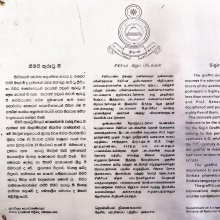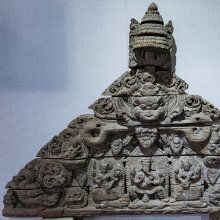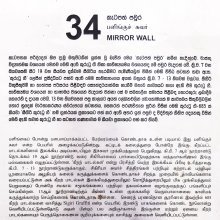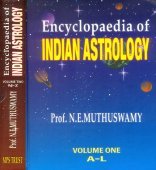Vastu, Vāstu: 37 definitions
Introduction:
Vastu means something in Buddhism, Pali, Hinduism, Sanskrit, Jainism, Prakrit, the history of ancient India, Marathi, Hindi, biology, Tamil. If you want to know the exact meaning, history, etymology or English translation of this term then check out the descriptions on this page. Add your comment or reference to a book if you want to contribute to this summary article.
Vastu has 36 English definitions available.
Images (photo gallery)
Languages of India and abroad
Sanskrit dictionary
[Deutsch Wörterbuch]
Source: Cologne Digital Sanskrit Dictionaries: Böhtlingk and Roth Grosses Petersburger WörterbuchVastu (वस्तु):—
--- OR ---
Vastu (वस्तु):—2. (von 5. vas) [Uṇādisūtra 1, 76.] n. [Amarakoṣa 3, 6, 2, 13.]
1) Sitz, Ort: vraṇa [Suśruta 1, 83, 7. 11.] Vgl. kapila . —
2) Ding, Gegenstand, ein reales Ding [Amarakoṣa 3, 4, 15, 88.] [Trikāṇḍaśeṣa 3, 2, 8.] [Hemacandra’s Abhidhānacintāmaṇi 168.] āpaṇe prasāritaṃ vastu [Pāṇini’s acht Bücher 6, 1, 82, Scholiast] iṣṭa [Meghadūta 111.] spṛhāvatī keṣu vastuṣu [Raghuvaṃśa 3, 5. 5, 18.] anāsthā vāhyavastuṣu [Kumārasaṃbhava 6, 13.] darśanīya [Śākuntala 25, 1.] parihārya [8. 175.] alpānāmapi vastūnāṃ saṃhatiḥ kāryakārikā [Spr. 237.] avasthā vastūni prathayati ca saṃkocayati ca [1713.] svabhāvasundaraṃ vastu [3331.] [Varāhamihira’s Bṛhajjātaka S. 51, 27.] asyāṃ (karaṇḍikāyāṃ) asti ca vastu kim [Kathāsaritsāgara 29, 10. 36, 65.] [Mārkāṇḍeyapurāṇa 81, 63.] strīvastvaicchat [] zu [Bṛhadāranyakopaniṣad] [S. 138.] yannāsti tadasti vastviti mṛṣā jalpadbhirāstikaiḥ [Prabodhacandrodaja 27, 9.] dhī [108, 5.] vāstava [Bhāgavatapurāṇa 1, 1, 2. 2, 6, 4. 10, 23.] vastūni paṇyāni [?6, 16, 6. 8, 6, 25. 8, 35. PAÑCAR. 1, 11, 12. Pañcatantra 157, 22. 253, 19. Hitopadeśa 114, 17, v. l.] bhakṣya [Hitopadeśa ed. JOHNS. 1916.] śrāddha [PAÑCAR. 1, 13, 21.] [Nīlakaṇṭha 26. 259.] [Bālabodhanī 14.] nityānityavastuviveka [Vedānta lecture No. 9.] [SARVADARŚANAS. 13, 4. 22, 20. fgg. 35, 1. 22. 44, 10.] vastujātam die Dinge [17, 12. 53, 10.] nāvastuno vastusiddhiḥ aus Nichts wird nicht Etwas [Kapila 1, 79.] aho vastuni mātsaryamaho bhaktiravastuni was da ist, was nicht da ist [Kathāsaritsāgara 21, 49.] avastunirbandhapara [Kumārasaṃbhava 5, 66.] [Kapila 1, 20.] [Bhāgavatapurāṇa 5, 10, 6. 7, 4, 33.] [Vedānta lecture No. 20. 79.] pratibuddhavastu adj. Realität [Bhāgavatapurāṇa 3, 28, 38.] kriyā hi vastūpahitā prasīdati ein würdiger Gegenstand [Raghuvaṃśa 3, 29.] vastūni so v. a. Geräthe [Bhāgavatapurāṇa 2, 6, 24.] vastupāṇayaḥ die zu Etwas erforderlichen Dinge in der Hand haltend [10, 84, 45.] vastu am Anfange eines comp. so v. a. vastutas (s. bes.) in Wirklichkeit [5, 18, 37.] —
3) Sache, Angelegenheit, das worum es sich handelt: yaccāpi sarvagaṃ vastu taccaiva pratipāditam [Mahābhārata 1, 70.] vastuṣvaśakyeṣu samudyamaścecchakyeṣu mohādasamudyamaśca [KĀM. NĪTIS. 15, 25.] nirvāhaḥ pratinnavastuṣu [Spr. 672.] smaraṇaṃ priyavastuṣu [1217.] na kiṃcitkvacidastīha vastvasādhyaṃ vipaścitām [1351.] satāṃ hi saṃdehapadeṣu vastuṣu pramāṇamantaḥ karaṇapravṛttayaḥ [273.] jñāta adj. [Kathāsaritsāgara 17, 53. 22, 191. 32, 131. 60, 226. 232.] vastuni vyaktimāgate [Rājataraṅgiṇī 1, 231.] vastu nirṇīyatāṃ svayam [6, 27.] hāsyavastuṣu [Mahābhārata 4, 118.] vaktāraḥ śāstravastuṣu [Harivaṃśa 13767.] udāharaṇavastuṣu [Kumārasaṃbhava 6, 65.] kasminnabhinayavastunyupadeśaṃ darśayiṣyāmi [Mālavikāgnimitra 16, 12.] pānabhojanavastuṣu [Spr. 402.] kopaprasādavastūni [749.] bhītaparitrāṇa [3172.] —
4) Stoff, Gegenstand einer Rede u.s.w. [Trikāṇḍaśeṣa 3, 2, 21.] im Gegens. zu vāc Form der Rede [Spr. 3975.] kālidāsagrathita (nāṭaka) [Śākuntala 3, 12.] [Vikramorvaśī 2. 3, 8.] [Mālavikāgnimitra 3, 9.] [DAŚAR. 1, 11. 51.] [Sāhityadarpana 5, 9. 129, 19. 257. fg. 281.] prādhānya [PRATĀPAR.7,a,5. 15,b,4. 20,a,2.] prativastubhāva [77,b,2.] dhvani [15,b,4. 9. 16,a,2. 8.] kathā [Rājataraṅgiṇī.1,8.] [Oxforder Handschriften 50,a, Nalopākhyāna 1.] nirdeśa Inhaltsangabe [Sāhityadarpana 559.] [kāvyādarśa 1, 14.] —
5) bei den Buddhisten so v. a. Statut [WASSILJEW 85.] —
6) vastusama [Mahābhārata 13, 5519] fehlerhaft für babhrusama, wie die ed. Bomb. liest. [Bhāgavatapurāṇa 9, 4, 27] liest die ed. Bomb. pattiṣu statt vastuṣu . — Vgl. prati, bhoga, maṅgalya, yathā, yuddha, raṅga .
--- OR ---
Vāstu (वास्तु):—
Sanskrit, also spelled संस्कृतम् (saṃskṛtam), is an ancient language of India commonly seen as the grandmother of the Indo-European language family (even English!). Closely allied with Prakrit and Pali, Sanskrit is more exhaustive in both grammar and terms and has the most extensive collection of literature in the world, greatly surpassing its sister-languages Greek and Latin.
See also (Relevant definitions)
Starts with (+200): Vaastukarm, Vastu-bhumi, Vastu-kritya, Vastu-kshetra-jaladhara-garta-marga-samanvita, Vastu-parivara, Vastu-prabhritaka, Vastu-purusha-mandal, Vastubahya, Vastubala, Vastubali, Vastubamdha, Vastubandhana, Vastubhamda, Vastubhau, Vastubhava, Vastubheda, Vastubhuta, Vastucakra, Vastucandrika, Vastucanti.
Ends with (+91): Adivastu, Adrishtavastu, Advitiyavastu, Aggalavastu, Ailapailavastu, Akarbanika-vastu, Amtaravastu, Amtarvastu, Anatmavastu, Antarvastu, Apavastu, Ashcaryavastu, Ativastu, Atmavastu, Avastu, Avyakrita-vastu, Bahyavastu, Bhakshyavastu, Bhautavastu, Bhogavastu.
Full-text (+1262): Vatthu, Vastuvidya, Kapilavastu, Vastushanti, Yuddhavastu, Vastushastra, Vastuvidhana, Vastujnana, Vastutattva, Vastukala, Vastuvicara, Vastukrita, Vastuyaga, Vastubhuta, Sauvastava, Shubhavastu, Vastupala, Vastuhani, Vastupurusha, Vastutas.
Relevant text
Search found 133 books and stories containing Vastu, Vāstu, Vastū, Vāstū, Vaastu, Vasthu, Vaasthu, Vasdu, Vasdhu; (plurals include: Vastus, Vāstus, Vastūs, Vāstūs, Vaastus, Vasthus, Vaasthus, Vasdus, Vasdhus). You can also click to the full overview containing English textual excerpts. Below are direct links for the most relevant articles:
Sahitya-kaumudi by Baladeva Vidyabhushana (by Gaurapada Dāsa)
Text 4.87 < [Chapter 4 - First-rate Poetry]
Text 4.77 < [Chapter 4 - First-rate Poetry]
Text 4.62 < [Chapter 4 - First-rate Poetry]
Vernacular architecture of Assam (by Nabajit Deka)
Development (c): Aryan Influence < [Chapter 3]
Architecture (f): Site Selection < [Chapter 3]
Techniques (f): Pre-measures of Construction < [Chapter 4]
Gati in Theory and Practice (by Dr. Sujatha Mohan)
Literary and dramatic elements in Nāṭyaśāstra < [Chapter 1 - Nāṭya]
Gati performed in Dhruvā-gāna < [Chapter 3 - Application of gati in Dṛśya-kāvyas]
Gati performed in Nṛtta < [Chapter 3 - Application of gati in Dṛśya-kāvyas]
Natyashastra (English) (by Bharata-muni)
Chapter XXXI - On the Time-measure (tāla)
Chapter IV - Description of the Class Dance (tāṇḍava)
Vastu-shastra (1): Canons of Architecture (by D. N. Shukla)
(ii) The Architecture (Sthāpatya) < [Chapter 3 - The Architect and Architecture]
(ii) The Site-planning (Vāstupada-vīnyāsa) < [Chapter 6 - Fundamental Canons of Hindu Architecture]
(iv.b) Aparājitapṛcchā (Subject-matter and Creation) < [Chapter 5 - Study of Hindu Science of Architecture]
Maha Prajnaparamita Sastra (by Gelongma Karma Migme Chödrön)
Puṇyakriyāvastu: preliminary note < [Part 5 - Establishing beings in the puṇyakriyāvastus]
Bodhisattva quality 14: skilled in teaching dependent origination < [Chapter X - The Qualities of the Bodhisattvas]
Bhūmi 5: the ground difficult to conquer (sudurjayā) < [Chapter XX - (2nd series): Setting out on the Mahāyāna]
Related products






